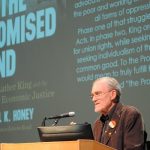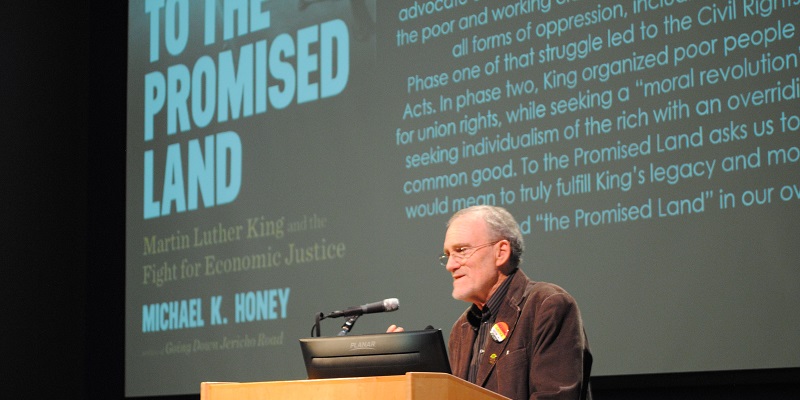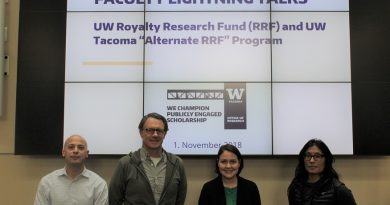UWT professor Michael Honey publishes new book
April 4 saw the release of Dr. Michael Honey’s newest book: “To the Promised Land: Martin Luther King and the Fight for Economic Justice.” Honey is currently the Fred and Dorothy Haley Professor of Humanities — an endowed professorship meant to uphold UWT’s humanities curriculum — and has taught labor, ethnic, and gender studies, American history, and Martin Luther King and nonviolence studies at UW Tacoma since 1990.
The release of the book on April 4 marked exactly 50 years since Martin Luther King Jr. was assassinated. Honey also held a lecture May 1 — significant to the labor movement as May Day or International Workers’ Day — in William W. Philip Hall.
Honey explained that “To the Promised Land: Martin Luther King and the Fight for Economic Justice” is a shorter and more accessible volume — at about 200 pages — which helps readers understand how King’s message of economic justice applies to the present.
“If you are suffering from heavy debt because of student loans, high rents and housing prices, police brutality, low wages, racism, sexism and misogyny, America’s forever wars all over the planet and its misplaced priorities, then you are among the people Dr. King sought to liberate,” Honey said.
The inspiration for Honey’s new book came from his personal background with King and the Civil Rights Movement. Honey said that King inspired him to become a conscientious objector and then a civil liberties organizer for six years in the South.
Honey served as the Southern director of the National Committee Against Repressive Legislation in Memphis. He then attended Howard University and studied African-American history.
“It seemed to me the biggest roadblock to freedom was that white workers and ‘white’ people generally sided with employers and politicians who wanted to divide us in order to exploit our labor,” Honey said. “I wanted to find examples of places where black and white workers had organized together to overcome, and I picked Memphis as a case study.”
Honey believes economic justice was an important aspect to King’s message — especially the connection between racism, poverty, and war and his emphasis of nonviolence. King was in Memphis for the Memphis Sanitation Workers’ Strike the day before he was killed.
“Beyond civil rights, King sought a peaceful revolution by which all of us, all of us, would have decent jobs, income, housing, education and health care,” Honey said. “His legacy touches on all those areas as they affect us today.”
“Going Down Jericho Road: The Memphis Strike, King’s Last Campaign” was published by Honey in 2007 and is about King’s economic message and the Memphis Strike. This title received the Robert F. Kennedy Book Award — a prestigious annual award recognizing books reflecting Robert F. Kennedy’s social justice values — along with four other awards and recognitions.
Honey saw the need for new scholarship on King’s economic message for today’s audience.
“There is always more to learn, and King’s message of hope for a better world is something we can all continue to benefit and learn from,” Honey said.





